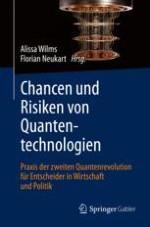2022 | OriginalPaper | Buchkapitel
12. Quantencomputing als Integrationsproblem: Quantenanwendungen sind in der Praxis immer hybride
verfasst von : Johanna Barzen, Frank Leymann
Erschienen in: Chancen und Risiken von Quantentechnologien
Verlag: Springer Fachmedien Wiesbaden
Aktivieren Sie unsere intelligente Suche, um passende Fachinhalte oder Patente zu finden.
Wählen Sie Textabschnitte aus um mit Künstlicher Intelligenz passenden Patente zu finden. powered by
Markieren Sie Textabschnitte, um KI-gestützt weitere passende Inhalte zu finden. powered by
